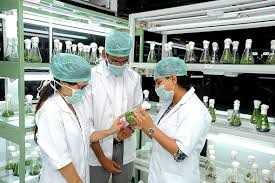From developing new drugs and medicines to genetic engineering of plants and animals, Biotechnology plays a major role in improving human life and the environment. This innovative field of science is evolving and bridging technology and biology, enabling major transformations in agriculture, medicine, industrial processes, and environmental science. For those who are passionate about science and invention, a B.Sc. (Bachelor of Science) in Biotechnology could be an ideal way to prepare for a dynamic and rewarding career. Here is everything you need to know about B.Sc. in Biotechnology program.
What is a B.Sc. in Biotechnology?
B.Sc. in Biotechnology is a three-year undergraduate program (in most countries, including India), focusing on the application of biological systems and organisms to develop useful products. It combines elements from biology, chemistry, physics and technology, preparing students to work in various industries such as pharmaceuticals, agriculture, food technology, healthcare, and environmental conservation.
This interdisciplinary course emphasises theoretical knowledge and practical skills by helping students understand biological processes at the molecular and cellular levels and how technology can manipulate them.
Core Subjects and Curriculum
When a student pursues a B.Sc. in Biotechnology, he is not just receiving education but evaluating prospects to work in science and technology fields. The B.Sc. Biotechnology curriculum is designed to provide a well-rounded knowledge and understanding of both biological sciences and their technological aspects. Common subjects include:
- Molecular Biology
- Cell Biology
- Genetics
- Microbiology
- Biochemistry
- Immunology
- Bioinformatics
- Genetic Engineering
- Bioprocess Engineering
- Plant and Animal Biotechnology
Along with classroom education, students also get opportunities for project research, laboratory work, and internships to attain practical experience. Some programs also include optional courses to help students specialise in their preferred areas of interest.
Eligibility Criteria
Students willing to get admission to the B.Sc. Biotechnology program must have a good academic record and have completed their 10+2 or equivalent from a renowned board in India. They should also have achieved a minimum of 60% marks in their 10+2 in Biology, Chemistry, and Physics. In addition, some colleges and universities also ask applicants to pass an entrance exam for admission.
Why You Should Enrol in the B. Sc. in Biotechnology Program?
B.Sc. in Bio Technology is one of the most popular courses in Biology. Once students complete their graduation, they can go for an M.Sc. in Biotechnology. This program is perfect for students who are inclined to study through practical classes and discover new opportunities in the field of Biotechnology. From getting career opportunities as research agents and professors to being genetic engineers in clinical research and diagnostics, a B. Sc. in Biotechnology exposes students to ample opportunities after completing their course.
A B.Sc. in Biotechnology program provides students with extensive knowledge and skills vital for entry-level positions in biotechnology. It also gives the essential foundation for advanced studies in this specific area. Those who complete this course are knowledgeable enough to follow many career paths in Biotechnology, like teaching, research, and product development.
Industries that commonly hire biotechnology graduates include:
- Pharmaceutical companies
- Biotech firms
- Agricultural and food technology companies
- Healthcare and diagnostics laboratories
- Environmental agencies
- Research institutions and universities
Advantages of Pursuing B.Sc. in Biotechnology
Practical & Research Skills
B.Sc. in Biotechnology is designed to provide students with a solid foundation in research methods and practical skills. During this program, students spend time in high-tech laboratories, study progressive equipment, and learn methods that experts use every day. Practical skills are quite different from aspects that students learn in the classroom, since several programs comprise projects and internships that allow students to gain real-world experience.
High Demand in the Job Market
The current demand for biotechnology is growing rapidly, and predictions indicate that the sector will grow even more rapidly in the coming years. Today, when the world is dealing with many health challenges, food security, and environmental issues, Biotechnologists find solutions to these problems.
Diverse Opportunities
After completing a B.Sc. in Biotechnology, students can find many opportunities both domestically and overseas. Biotechnology is important in several fields, like vaccine development, genetic engineering, and agricultural enhancement. Getting a degree in this field can help students be more productive in their career.
High Salary & Job Security
It provides students with high-paying job profiles and perks. Today, Biotechnology is seen as the safest and recession-proof industry. The discipline gives students the knowledge and expertise that can help them cope with unpredictable circumstances.
Scope of Doing B.Sc. in Biotechnology?
- Biotechnologist
- Research scientist
- Conservation biologist
- Environmental Scientist
- Laboratory Technician
- Bio-Tech Educator
- Healthcare professional
A B.Sc. in Biotechnology is more than just a degree—it’s a gateway to a future where science meets innovation. With the world increasingly relying on biotechnological solutions, now is an exciting time to enter the field. Whether your passion lies in research, healthcare, agriculture, or entrepreneurship, this program provides the knowledge and tools to shape a career that is both impactful and rewarding.
Author bio
The author is an education specialist with vast knowledge in the field of education. He constantly stays updated on the constantly evolving education sector. He is also a renowned student counsellor who provides guidance to students with queries regarding their education.





Comments